Search -
History of Baalbek
History of Baalbek
Author:
At one time, the worldwide fame of the ruins at Baalbek drew huge numbers of tourist crowds. In the present day, a trip to Baalbek is extremely difficult and considerably dangerous. Luckily, the former curator of the site, Michel M. Alouf, made his years of research available in this heavily illustrated work. The massive multi-level platform fou... more »
Author:
At one time, the worldwide fame of the ruins at Baalbek drew huge numbers of tourist crowds. In the present day, a trip to Baalbek is extremely difficult and considerably dangerous. Luckily, the former curator of the site, Michel M. Alouf, made his years of research available in this heavily illustrated work. The massive multi-level platform fou... more »
ISBN-13: 9781585090631
ISBN-10: 1585090638
Pages: 200
Rating: ?
ISBN-10: 1585090638
Pages: 200
Rating: ?
0 stars, based on 0 rating
Genres:
- History >> Asia
- History >> Middle East
- History >> World
- Religion & Spirituality >> Religious Studies >> History
- Nonfiction >> Social Sciences >> Archaeology




